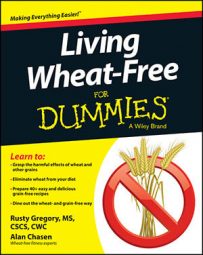At first glance, it may seem contradictory to mention a wheat/grain-free, low-carb lifestyle and vegetarianism in the same sentence. Vegetarianism is all about carbs, particularly when you stick primarily to fruits, vegetables, and grains. Many people expand their diets by drinking soft drinks and eating chips, all in the name of vegetarianism.
Maintaining a vegetarian diet while eliminating wheat, added sugar, and vegetable and seed oils would be quite a challenge because of the blood sugar–raising effects of many fruits. Reducing the amount of fructose necessary to keep blood sugar levels down means cutting back on several types of fruits such as watermelon, raisins, and bananas.
Our DNA was never designed to handle vegetarianism, especially when you have to take supplements, such as vitamin B-12, to meet your nutritional needs. Additionally, reducing cholesterol levels with a lowfat diet causes vitamin D deficiencies (vitamin D is synthesized via cholesterol).
The most basic definition of vegetarianism is that vegetarians don't eat meat. However, many variations of vegetarianism exist. Here's a look at a few subcategories of vegetarianism and how they do or don't relate to a wheat/grain-free lifestyle.
Fruitarianism: Fruitarianism can be defined in several different ways, but generally speaking, fruitarians eat only or mostly fruit; stricter adherents avoid nuts, seeds, and grains — anything that can be harvested. True, a fruitarian diet is usually grain-free, but it's far from ideal.
The stress it places on the liver (from an excess of fructose, an omega-6 fatty acid overload if nuts are included, and a lack of dietary fat) greatly jeopardizes your health. Therefore, don't try fruitarianism, even though its grain restrictions involve eliminating wheat.
Lacto-ovo vegetarian: Lacto-ovo vegetarians eliminate all meat, but do eat eggs and dairy products. (Lacto is Latin for “milk,” and ovo is Latin for “egg.”) This allows great latitude for vegetarians.
Eliminating wheat and other grains from a lacto-ovo vegetarian diet is possible, but the high carbohydrate content that still remains will elevate blood sugar and triglyceride levels. Keeping fat in the diet by eating eggs and dairy will help in raising HDL (good cholesterol) numbers.
Pescatarian: Although not considered true vegetarians, pescatarians eat fish and seafood with their otherwise-vegetarian diet. Typically, most people have elevated omega-6 fatty acid levels. When combined with low levels of omega-3 fatty acids, inflammation occurs and disease results.
Because fish are rich in omega-3 fatty acids, pescatarianism may help balance omega-6 and omega-3 fatty acids. By sticking to a pescatarian diet that's also free from wheat, grains, and vegetable oil, this high ratio can be reduced to the desirable 1:1.
Raw food: Though a raw diet doesn't expressly forbid eating meat, it does shun cooking food at temperatures higher than 118 degrees. Therefore, most raw food folks are vegetarians. The theory is that cooking the food any hotter saps the enzymes necessary for proper digestion.
The problem with this idea is that the body, not the food itself, provides all the enzymes needed for digestion. By eliminating wheat and grains from a raw food diet, a diet similar to pescatarianism may emerge.
Veganism: Veganism is a lifestyle that promotes respect to all animals. In the truest sense, vegans steer clear of all products that exploit animals. That means not only avoiding eating meat, dairy, eggs, and so on but also refusing to wear fur and leather or use products tested on animals.
Vegans eat all fruits, vegetables, grains, beans, and legumes. Veganism is deficient in certain vitamins and minerals and deficient in fat to the point of producing unhealthy cholesterol numbers and elevated blood sugar levels, which is why it’s unhealthy to try pairing this form of vegetarianism with a wheat- or grain-free lifestyle.
A vegetarian diet isn't synonymous with a healthy diet. A person who only eats potato chips and cookies and drinks soda would be considered a vegetarian but far from healthy.

